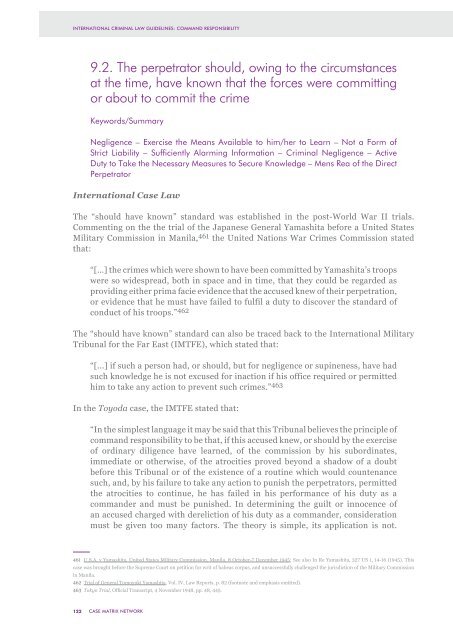Command Responsibility
CMN_ICL_Guidelines_Command_Responsibility_En
CMN_ICL_Guidelines_Command_Responsibility_En
You also want an ePaper? Increase the reach of your titles
YUMPU automatically turns print PDFs into web optimized ePapers that Google loves.
INTERNATIONAL CRIMINAL LAW GUIDELINES: COMMAND RESPONSIBILITY<br />
9.2. The perpetrator should, owing to the circumstances<br />
at the time, have known that the forces were committing<br />
or about to commit the crime<br />
Keywords/Summary<br />
Negligence – Exercise the Means Available to him/her to Learn – Not a Form of<br />
Strict Liability – Sufficiently Alarming Information – Criminal Negligence – Active<br />
Duty to Take the Necessary Measures to Secure Knowledge – Mens Rea of the Direct<br />
Perpetrator<br />
International Case Law<br />
The “should have known” standard was established in the post-World War II trials.<br />
Commenting on the the trial of the Japanese General Yamashita before a United States<br />
Military Commission in Manila, 461 the United Nations War Crimes Commission stated<br />
that:<br />
“[…] the crimes which were shown to have been committed by Yamashita’s troops<br />
were so widespread, both in space and in time, that they could be regarded as<br />
providing either prima facie evidence that the accused knew of their perpetration,<br />
or evidence that he must have failed to fulfil a duty to discover the standard of<br />
conduct of his troops.” 462<br />
The “should have known” standard can also be traced back to the International Military<br />
Tribunal for the Far East (IMTFE), which stated that:<br />
“[...] if such a person had, or should, but for negligence or supineness, have had<br />
such knowledge he is not excused for inaction if his office required or permitted<br />
him to take any action to prevent such crimes.” 463<br />
In the Toyoda case, the IMTFE stated that:<br />
“In the simplest language it may be said that this Tribunal believes the principle of<br />
command responsibility to be that, if this accused knew, or should by the exercise<br />
of ordinary diligence have learned, of the commission by his subordinates,<br />
immediate or otherwise, of the atrocities proved beyond a shadow of a doubt<br />
before this Tribunal or of the existence of a routine which would countenance<br />
such, and, by his failure to take any action to punish the perpetrators, permitted<br />
the atrocities to continue, he has failed in his performance of his duty as a<br />
commander and must be punished. In determining the guilt or innocence of<br />
an accused charged with dereliction of his duty as a commander, consideration<br />
must be given too many factors. The theory is simple, its application is not.<br />
461 U.S.A. v Yamashita, United States Military Commission, Manila, 8 October-7 December 1945; See also In Re Yamashita, 327 US 1, 14-16 (1945). This<br />
case was brought before the Supreme Court on petition for writ of habeas corpus, and unsuccessfully challenged the jurisdiction of the Military Commission<br />
in Manila.<br />
462 Trial of General Tomoyuki Yamashita, Vol. IV, Law Reports, p. 82 (footnote and emphasis omitted).<br />
463 Tokyo Trial, Official Transcript, 4 November 1948, pp. 48, 445.<br />
122<br />
CASE MATRIX NETWORK


